My garden is in disrepair. The growing season is now over, and with it went the lush productive summer garden that I coaxed out of unassuming little seeds. I hauled in compost, mulched, weeded and nurtured the little seedlings into full-grown fecundity. All that is over now. Now, the tomato plants are full of fungus, and the fruit a mushy mess, the eggplants have died, the pepper and cucumbers have rotted. The garden is a ruin, partly because the season has ended, but mostly because of my neglect. I killed multiple rounds of fall seedlings and I have failed to clear the beds of summer debris and sow seeds for winter root vegetables, leaving me with no winter garden. The garden looks like a sorry reflection of what it once was or what it could have been. A ruin.
I recognize that there is a certain arrogance in labeling the garden as ruined because it failed to conform to my sense of value and proportion. If the garden could talk, it would beg to differ. While I raged and wallowed in self-pity, the garden continued to do its thing. The dill had gone to seed looking unappealingly brown and scraggly. I never managed to pull it, the beginning of neglect. The wind dispersed the seeds all over, and there will soon be little dill seedlings sprouting all over the garden beds. As far as dill is concerned, this is success. The ground cherry plants made a veritable carpet of these fallen fruit, the seeds of which will become seedlings next summer. The green bean pods dried on the vine, ready to continue the cycle next season. Underneath the soil surface, the delicate ecosystem of worms, fungus and bacteria continued to feed on the organic matter from the root systems, building rich and robust soil structure.
The garden doesn’t exist to serve me. It doesn’t know that it is on my land and I am its master. Instead, it exists in a perpetual conversation with nature, both within and without, the garden fence and property boundaries notwithstanding. It is like this most diverse and complex improv show, where each element is responding to the whole, while being part of the whole, resulting in an incredibly harmonious production – and all of it happening irrespective of my participation. This is a humbling thought, but also liberating at the same time. The garden has existed before me, and will continue after me. Sure, I can favor certain plants over others and create conditions for them to thrive, but I am not guaranteed an outcome of my choice. I am, after all, but one of the multitude of participants in this incredible improv show. This realization allows me to not take myself too seriously, go at it lightly with joy and curiosity, and let the garden surprise me, even as I endeavor to coax an outcome that I value.
As I learn to negotiate these disappointments and ponder over my role in the garden, it gives me solace and clarity about something much bigger – my place in this incredible world with all its baffling complexity and contradictions. It is indeed a true privilege to be here, in this moment, to be able to contribute my bit to this immense improv exercise, and be open to discover the outcome.
Yes, the growing season has ended and the garden is in disrepair, but all is not lost. There is the hope, anticipation and, dare I say, excitement for the next season that is still full of possibilities. I tell myself, it is never too late.


Leave a Reply